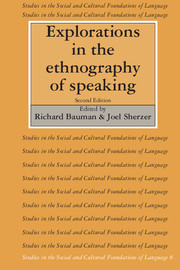Book contents
- Frontmatter
- Contents
- INTRODUCTION TO THE SECOND EDITION
- I PREFACE AND INTRODUCTION
- II COMMUNITIES AND RESOURCES FOR PERFORMANCE
- III COMMUNITY GROUND RULES FOR PERFORMANCE
- IV SPEECH ACTS, EVENTS, AND SITUATIONS
- V THE SHAPING OF ARTISTIC STRUCTURES IN PERFORMANCE
- Introduction
- 14 Correlates of Cree Narrative Performance
- 15 An Analysis of the Course of a Joke's Telling in Conversation
- 16 When Words Become Deeds: An Analysis of Three Iroquois Longhouse Speech Events
- 17 The Ethnographic Context of Some Traditional Mayan Speech Genres
- 18 To Speak with a Heated Heart: Chamula Canons of Style and Good Performance
- VI TOWARD AN ETHNOLOGY OF SPEAKING
- Notes
- References
- Index of names
18 - To Speak with a Heated Heart: Chamula Canons of Style and Good Performance
Published online by Cambridge University Press: 05 June 2012
- Frontmatter
- Contents
- INTRODUCTION TO THE SECOND EDITION
- I PREFACE AND INTRODUCTION
- II COMMUNITIES AND RESOURCES FOR PERFORMANCE
- III COMMUNITY GROUND RULES FOR PERFORMANCE
- IV SPEECH ACTS, EVENTS, AND SITUATIONS
- V THE SHAPING OF ARTISTIC STRUCTURES IN PERFORMANCE
- Introduction
- 14 Correlates of Cree Narrative Performance
- 15 An Analysis of the Course of a Joke's Telling in Conversation
- 16 When Words Become Deeds: An Analysis of Three Iroquois Longhouse Speech Events
- 17 The Ethnographic Context of Some Traditional Mayan Speech Genres
- 18 To Speak with a Heated Heart: Chamula Canons of Style and Good Performance
- VI TOWARD AN ETHNOLOGY OF SPEAKING
- Notes
- References
- Index of names
Summary
This paper explores a central metaphor which Chamulas use to talk about and evaluate speaking. I shall attempt to show how this metaphor – heat – functions as a basic canon of native criticism of nearly all kinds of speech performances which Chamulas recognize, from ordinary language to formal ritual speech and song. Heat possesses great religious significance because its primary referent is the sun deity (htotik k'ak'al ‘Our Father Sun’), who created and now maintains the basic temporal, spatial, and social categories of the Chamula cosmos. Controlled heat, therefore, symbolizes order in both a diachronic and synchronic sense. Language is but one of several symbolic domains which Chamulas think and talk about in terms of heat metaphors. Ritual action, the life cycle, the agricultural cycle, the day, the year, individual festivals, political power, economic status – all are measured or evaluated in units which derive ultimately from ‘Our Father Sun,’ the giver of order. Canons of verbal style and performance will therefore be described as ideal patterns which extend, in homologous fashion, into the whole fabric of Chamula social life and expressive behavior. I hope, thereby, to show how certain Chamula ethical and esthetic values behave as a unitary normative code.
After describing the community and the categories of cosmology which give symbolic power to the heat metaphor, I shall briefly outline the categories of verbal behavior which Chamulas recognize.
- Type
- Chapter
- Information
- Explorations in the Ethnography of Speaking , pp. 389 - 414Publisher: Cambridge University PressPrint publication year: 1989
- 6
- Cited by



